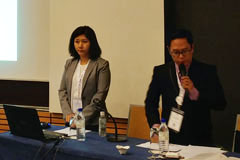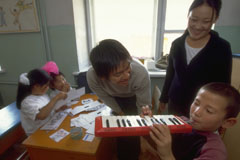JICA Research Institute Presents "Disability and Education" Research Project Findings in Malaysia
2017.08.24
The three-day International Conference on Special Education (ICSE) convened on July 31, 2017 at the Borneo Convention Centre Kuching in Malaysia. On August 1, the JICA Research Institute (JICA-RI) presented the findings of the "Disability and Education" research project.
Approximately 650 people from 32 countries participated in ICSE. Researchers, medical professionals, governmental representatives, and aid practitioners who are involved in special education conducted lively discussions. The participants shared ideas for future progress in special education, including vital factors for achieving inclusive education, in which children with disabilities and those without learn in the same classroom. In addition, educators of disabled students presented examples of utilizing ICT and cutting-edge technology.

Former JICA-RI Research Fellow Yuriko Kameyama (left)
Three researchers from JICA-RI involved in the "Disability and Education" research project gave individual reports on the theme of educating children with disabilities and inclusive education in Asia. They gave an overall explanation of the project, introduced the aims and methodology of the research, and reported on the findings in light of analysis in Mongolia and Cambodia.
Former JICA-RI Research Fellow Yuriko Kameyama (Visiting Researcher, Waseda University) reported on the results of an awareness survey conducted in Mongolia regarding obstacles to educating children with disabilities as seen from the perspectives of parents/guardians and teachers. Kameyama suggested that, regardless of whether or not students have a disability, providing opportunities for better education requires not only teacher training, but also comprehensive intervention, including material and monetary elements. She also pointed out the need for stronger collaboration between teachers and parents/guardians and between regular schools and special-needs schools.
Former JICA-RI Research Assistant Yuji Utsumi gave a report on the situation of out-of-school children with disabilities in Mongolia. He mentioned that children with disabilities tend to be in a lower grade than they should for their age, and the dropout rate is particularly high for first grade elementary school students. Disability itself, as well as the lack of understanding by others and poor access to schools, prevents children from attending formal schools. There is also a high tendency for out-of-school children with disabilities to spend their time watching television and playing, rather than attending school. Only 22% of them have ever received non-formal education.
Waseda University Research Associate Diana Kartika, who conducted analysis in Cambodia with JICA-RI Visiting Fellow Kazuo Kuroda (Professor, Waseda University) gave a report on factors influencing teachers' perspectives regarding inclusive education. She suggested policies for improving teaching skills and meeting the demand for education of children with disabilities. The policies include establishing a systematic method of high-quality teacher training and on-site support, building greater social awareness of disabilities, and collaboration between NGOs and donors.
In response to a question regarding how the research findings will be applied to actual practice, Kameyama said that JICA-RI has held discussions with the governments of Mongolia and Cambodia, and has partnered to contribute to JICA projects, adding that she will continue making presentations to donors and practitioners in the future.

Children in a special school in Ulaanbaatar, Mongolia (Photo: JICA/Kenshiro Imamura)
Through the conference, government representatives and people engaged in special education in developing countries shared the findings of research and deepened their interest in the topic. In addition to this, JICA-RI researchers gained new knowledge from other participants.

事業事前評価表(地球規模課題対応国際科学技術協力(SATREPS)).国際協力機構 地球環境部 . 防災第一チーム. 1.案件名.国 名: フィリピン共和国.

事業事前評価表(地球規模課題対応国際科学技術協力(SATREPS)).国際協力機構 地球環境部 . 防災第一チーム. 1.案件名.国 名: フィリピン共和国.

事業事前評価表(地球規模課題対応国際科学技術協力(SATREPS)).国際協力機構 地球環境部 . 防災第一チーム. 1.案件名.国 名: フィリピン共和国.

事業事前評価表(地球規模課題対応国際科学技術協力(SATREPS)).国際協力機構 地球環境部 . 防災第一チーム. 1.案件名.国 名: フィリピン共和国.

事業事前評価表(地球規模課題対応国際科学技術協力(SATREPS)).国際協力機構 地球環境部 . 防災第一チーム. 1.案件名.国 名: フィリピン共和国.
scroll